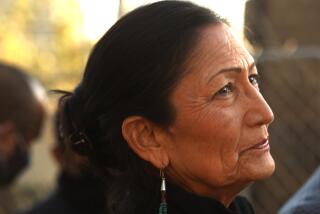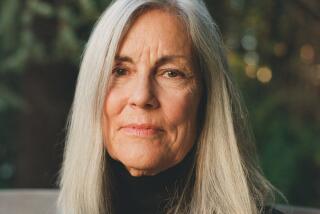Aleut Mother Says She’ll Never Give Child to Tribe : Adoption: She swears she was ‘neglected and abused’ in Alaskan tribal village as a girl. Battle over custody of unwed teen’s baby rages in U.S., Canadian courtrooms.
- Share via
SANTA ANA — Jodi Argleben, the Aleut Indian mother who is battling her native Alaskan tribe over custody of her 6-month-old daughter, swore in court papers filed Tuesday that she will never surrender her child to the tribe.
In an affidavit filed in Orange County Superior Court, Argleben, 18, of Cypress said she would raise little Rebecca herself before she would allow the tribe to bring her up in the tiny, poor town of Akhiok on Kodiak Island, Alaska, where Argleben said she was “‘badly neglected and abused” by her own parents as a baby.
Argleben, a single mother, spirited her baby to a couple in Vancouver, British Columbia, for adoption three months ago. But Rebecca is now the center of a multi-sided tug of war in courts in Santa Ana and Vancouver. A judge in Vancouver is expected to issue a decision soon on whether the Indian tribe has the right to exert its claim.
Argleben’s affidavit, which was also filed in the Canadian court, marks her first detailed, public account of her struggle with the Aleuts. The high school senior, who was adopted at age 3 by a non-Indian family, has been staying in an undisclosed location since she left her baby with the Canadian couple.
“Giving up my baby was the most difficult and painful thing I have ever done in my life,” Argleben said. “It hurt me for a long time and continues to hurt me to this day, but I know I made the right decision because I know my baby is receiving all the love and affection that she should have.”
Argleben, whose parents were each half Aleut and half Russian, said she does not understand why Rebecca’s adoption is so important to the tribe.
“I don’t understand why the Indians and their attorneys feel that I should give them my baby, who is only one-quarter, so that they can place her where my birth father died prematurely of alcohol abuse, my mother left, my oldest sister disappeared from, my other sister and I were abused and neglected,” Argleben said.
“I can’t understand why they are making such a big fuss over my baby when they did nothing when my sister and I were adopted and nothing since. . . . The Indians didn’t care about us at the time and haven’t since.”
Argleben, who visited Akhiok in August to consider it as a home for Rebecca, said she does not want her daughter raised there because the village of about 80 people offers few opportunities for children. It is dirty, poor, has “an unbearable smell” and lacks medical care, she said.
The villagers showed no warmth toward her baby, Argleben said, and she began to suspect they were interested in Rebecca only “as an extra number to a very small tribe” and for “her future ability to reproduce.”
In court, the Aleuts have claimed Rebecca under provisions of federal law designed to slow the breakup of native American tribes. Lawyers have argued that maintaining the heritage of native Americans is a legitimate goal of the law.
While Argleben was pregnant, she arranged for a New York couple to adopt her baby, but the Aleuts objected and the arrangement fell through. She said she was “shocked and very upset” because she had no idea the Indians had the right to block the adoption.
“I did not even consider my baby to be an Indian and up to the date of her birth, the Indians had never shown any interest in her or me,” Argleben said.
On July 1, about three weeks after Rebecca’s birth, the Indians “made my baby a member of their tribe by voting her in under their own rules,” she said. On July 28, Argleben sent a letter to the tribe resigning her membership, she said.
In the meantime, her boyfriend, the baby’s father, broke up with her because he “couldn’t emotionally handle the situation” and feared that if Jodi kept the baby he would be financially responsible for her, Argleben said.
After the Aleuts’ persistence convinced her she could not place Rebecca where she chose, Argleben said, a lawyer helped her find a family in Canada. She and her mother visited in September, liked the family immediately and left the child with them, she said.
When she got home, she found private investigators had been looking for her, she said. Frightened and hoping to spare her family more trauma, she went to stay with a friend.
Argleben said she thinks the adoptive couple can provide a “loving, stable environment to grow up in as I did after my adoption by my present parents.”
Argleben said she hopes to finish her education. She said that would be difficult if she kept Rebecca, but she added, “If for any reason the prospective adoptive parents cannot adopt my child, I will then take her back before I would allow her to go to the Indian tribe.”
More to Read
Sign up for Essential California
The most important California stories and recommendations in your inbox every morning.
You may occasionally receive promotional content from the Los Angeles Times.










